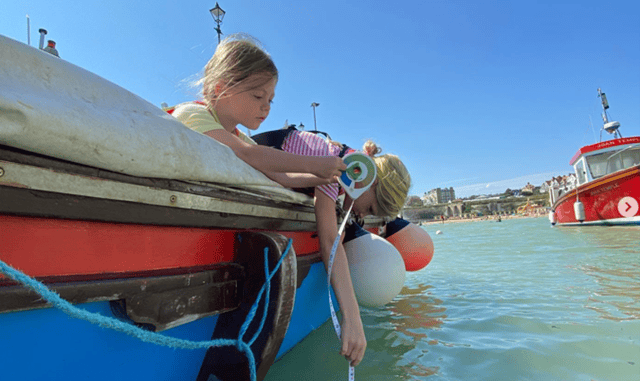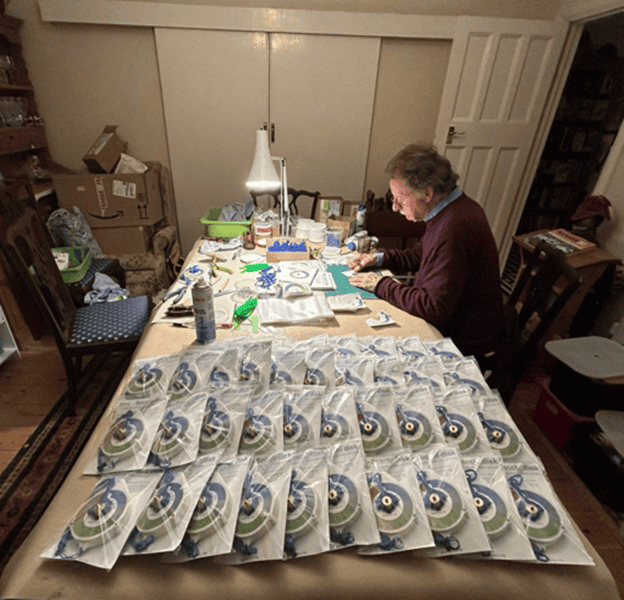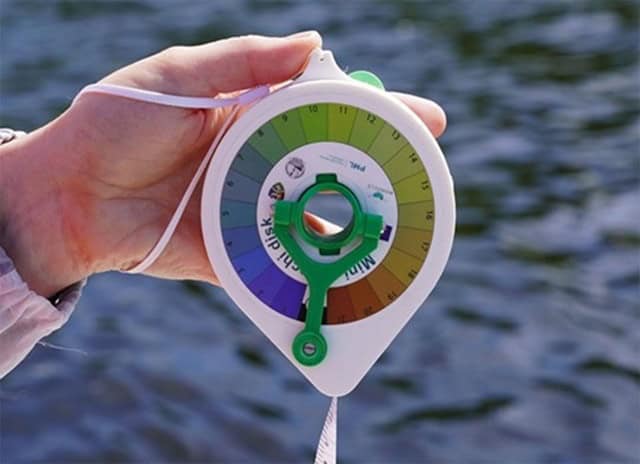
By Charlotte Allen
A compact and low-cost tool created by two brothers that tests water clarity with a connected app to notify users if there are bacterial hotspots in fishing and drinking waters has now been used in 17 countries with plans to expand that use even further.
The Mini-Secchi handheld device was invented and launched by brothers Tom and Bob Brewin from the dining room of Tom’s Broadstairs home. It is named after Angelo Secchi, an Italian philosopher from 150 years ago.
Tom, 43, is a teacher specialising in product design at Chatham and Clarendon Grammar School, Ramsgate. During his 20 years of teaching, he has been an advocate for giving back to the community. In 2020, he led a team of volunteers during the ‘Covid-19 PPE shortage’, managing to manufacture and distribute 31,168 visor masks to key workers and hospitals across the southeast.
Bob (pictured on right), 41, is a lecturer at Exeter University specialising in marine remote sensing. His work has inspired many, earning him the ‘2018 Young Investigator Award’, and he has published more than 100 academic research papers.
In their spare time, the brothers enjoy being together: tinkering, inventing, and collaborating. They also take Bob’s three children, Phoebe (9), Chloe (7), and Felix (5), on their family boat at Broadstairs Harbour.
Growing up, the two spent countless hours surfing, sailing, and fishing with their father. This early exposure shaped Bob’s academic career, leading him to graduate from Plymouth University with a first-class degree in Surf Science and Technology.
Tom said: “It’s cliché to say, but we are coastal people and we care deeply about the sea and the environment that surrounds it.”
With their expertise in ocean technology and design, the two aim to make a collaborative change focusing on accessibility and modernisation of aquatic tools.

This led to the launch of Brew-Tek, a company launched by the brothers in 2021. Initially, it was started with the hope of spending more time together, as Bob and his family now live in Cornwall. However, it has managed to change marine data collection and aquatic sustainability.
Tom explained: “The idea was to generate a low-cost science tool which could be used to produce good data and create awareness and an aspiration to make ownership of the environment.”
Following this idea and Tom’s educational experiences in India, he said: “The cost of high tariffs on scientific instruments in developing countries makes it practically impossible for typical people to afford them.”
This lack of accessibility to information regarding aquatic environments within local communities and globally has resulted in 40% of the world’s population being at health risk due to scarce data on water quality.
Access to low-cost tools to monitor the marine environment would contribute towards assisting in climate change adaptation efforts.

The two created the ‘Mini-Secchi’, a small tool that tests water clarity by colour and measurements. The app connected to the tool can notify users if there are bacterial hotspots in fishing and drinking waters from human influence and natural disasters.
Tom said: “Mini-Secchi’s name is derived from the Italian scientist Angelo Secchi and his iconic work on water transparency and the handheld size of the device.
“It works by lowering the disk into the water and measuring the depth at which it disappears. The other element has a colour scale which is compared with the colour of the disk at half the Secchi depth. The regular number then gets logged.”
The tool has already been used in 17 countries, with plans to expand to South America, Germany, and South Africa. The app is also being developed to make readings simpler, quicker, and easier to store for later comparison.

As this was a two-man project, they hope to mass-produce the product using injection moulding manufacturing in a factory.
Currently, users can download the 3D printed model of the Secchi device, making the product available to everyone at a low cost. Any orders on the website can be shipped worldwide at a lower price than anything similar on the market.
After the overwhelming response, Brew-Tek took part in ‘Santander X’, a community where small businesses can establish connections with entrepreneurs, investors, and gain coverage in general. In this case, it would be a great step towards mass-producing the tool.
After going through the pitching stages, they managed to get to the last 100 businesses out of 1,600. They hope this will start conversations with scientific influencers to increase production and daily use.
Find out more at https://www.brewtek.online/



